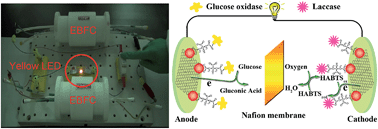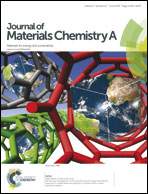Design of an enzymatic biofuel cell with large power output†
Abstract
Enzymatic biofuel cells (EBFCs) utilize redox enzymes as the catalysts to produce energy from green and renewable fuels, and are considered as promising, environmentally friendly power sources. However, EBFCs are limited by the relatively slow rate of electron transfer between enzymes and electrodes, which is a major barrier to improving EBFC power output. In this study, enzymes were bound to the hydrophilic, carboxyl group functionalized graphene–gold nanoparticle hybrid, and the hybrid as electrode material was able to increase the rate of electron transfer in the EBFC. The open-circuit voltage (Eocvcell) of this designed EBFC reached 1.16 ± 0.02 V, and the maximal power density (Pmax) was as high as 1.96 ± 0.13 mW cm−2. Two as-prepared EBFC units arranged in series were able to light up red and yellow light-emitting diodes (LEDs). Also, using these EBFCs, the Eocvcell and Pmax retained 80% and 66% of their optimal values over 70 days, respectively. This fabricated EBFC is expected to find applications in the bioenergy fields.


 Please wait while we load your content...
Please wait while we load your content...